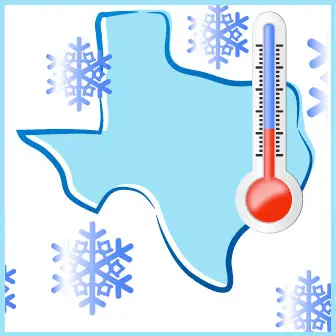44
DFW Freezing Weather Information

We had a fairly mild summer, as we only reached 100 degrees five times, which is way below our average of twenty.
Now we turn our attention to winter weather. According to the National Weather Service, there is a likelihood of above-normal temperatures and normal precipitation this winter. This outlook is largely influenced by the presence of a developing La Nina climate pattern, which typically results in warmer and drier conditions across the southern tier of the United States.
We are likely just weeks away from our first freeze. Last year, we had our first freeze last year on December 6th, just a couple of weeks later than our average first freeze, which is November 22nd.
Following is some additional weather information to help get you in the right frame of mind:Number of days that the temperature reaches freezing
- Winter 2024/2025—30
low temperature—12 degrees - Winter 2023/2024—15
low temperature—11 degrees - Winter 2022/2023—21
low temperature—11 degrees - Winter 2021/22—37
low temperature—19 degrees - Winter 2020/2021—24
low temperature— -2 degrees (February 16th) - Winter 2019/2020—21
low temperature—22 degrees - Winter 2018/2019—28
low temperature—21 degrees - Winter 2017/2018—25
low temperature—13 degrees - Winter 2016/2017—11
low temperature—14 degrees - Winter 2015/2016—17
low temperature—27 degrees - Winter 2014/2015—40
low temperature—16 degrees - Winter 2013/2014—55
low temperature—15 degrees - Winter 2012/2013—28
low temperature—22 degrees
First & last freezes
- Average first freeze—November 22nd
- Average last freeze—March 13th
- Earliest first freeze—October 22, 1898
- Latest first freeze—January 4, 1972
- Earliest last freeze—February 5, 2000
- Latest last freeze—April 13, 1957 & 1997
Number of freezes
Average freezes in a season—29
Average freezes by month
- October—.1
- November—2.3
- December—8.1
- January—10.6
- February—6.2
- March—1.9
- April—.1
Most freezes in a season—62 (1977-78)
Most freezes by month
- October—3 (1925)
- November—12 (1959)
- December—21 (1963, 1989)
- January—27 (1940, 1978)
- February—21 (1905, 1978)
- March—10 (1965)
- April—2 (1920, 1957)
Fewest number of freezes—11 (2016-17)
low temperature—12 degrees
low temperature—11 degrees
low temperature—11 degrees
low temperature—19 degrees
low temperature— -2 degrees (February 16th)
low temperature—22 degrees
low temperature—21 degrees
low temperature—13 degrees
low temperature—14 degrees
low temperature—27 degrees
low temperature—16 degrees
low temperature—15 degrees
low temperature—22 degrees
What can really be difficult on pool equipment is consecutive number of hours below freezing—the record by a long shot is 295 consecutive hours between December 18-30, 1983. We would have surpassed this record in February of 2021 had it not been for a few hours above freezing, which was sandwiched by extremely low temperatures. You might best remember that as when we had the major power grid failure, which caused substantial freeze damage and even a some fatalities.
If you have pool problems or questions as it relates to freezing weather, feel free to give our Service Department a call at (940)384-7665.
Sources: https://www.weather.gov/fwd/d32data & WFAA Channel 8.
Matt has been around the pool business since he was born. When he graduated college in 1984, he joined the family business working for Gohlke Pool Supply. The following year Matt and his father formed a partnership, Gohlke Custom Pools, and started offering pool construction.





